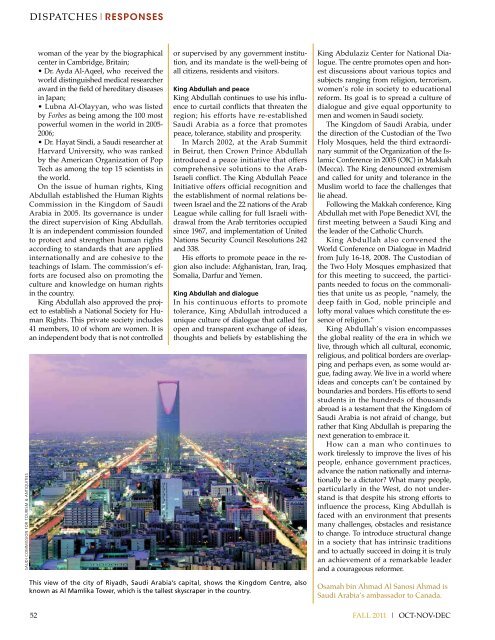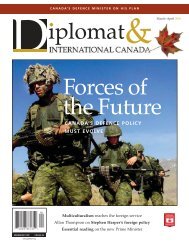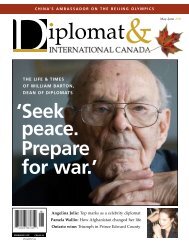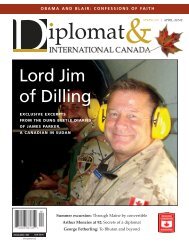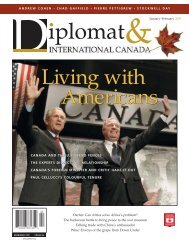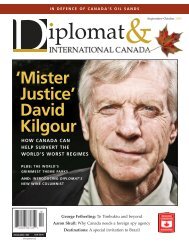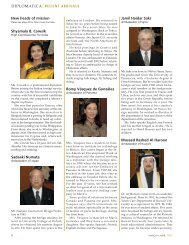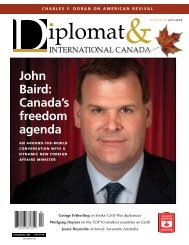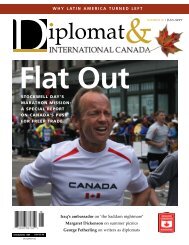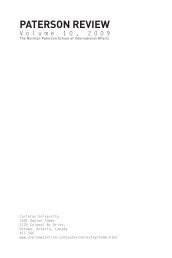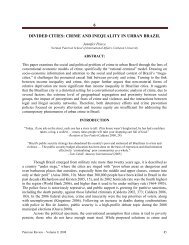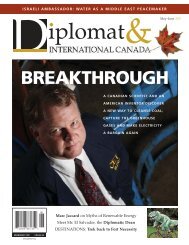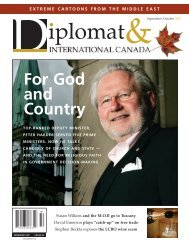the new petro power paradigm - Diplomat Magazine
the new petro power paradigm - Diplomat Magazine
the new petro power paradigm - Diplomat Magazine
You also want an ePaper? Increase the reach of your titles
YUMPU automatically turns print PDFs into web optimized ePapers that Google loves.
Di spatches|responses<br />
Saudi Commission for Tourism & Antiquities<br />
woman of <strong>the</strong> year by <strong>the</strong> biographical<br />
center in Cambridge, Britain;<br />
• Dr. Ayda Al-Aqeel, who received <strong>the</strong><br />
world distinguished medical researcher<br />
award in <strong>the</strong> field of hereditary diseases<br />
in Japan;<br />
• Lubna Al-Olayyan, who was listed<br />
by Forbes as being among <strong>the</strong> 100 most<br />
<strong>power</strong>ful women in <strong>the</strong> world in 2005-<br />
2006;<br />
• Dr. Hayat Sindi, a Saudi researcher at<br />
Harvard University, who was ranked<br />
by <strong>the</strong> American Organization of Pop<br />
Tech as among <strong>the</strong> top 15 scientists in<br />
<strong>the</strong> world.<br />
On <strong>the</strong> issue of human rights, King<br />
Abdullah established <strong>the</strong> Human Rights<br />
Commission in <strong>the</strong> Kingdom of Saudi<br />
Arabia in 2005. Its governance is under<br />
<strong>the</strong> direct supervision of King Abdullah.<br />
It is an independent commission founded<br />
to protect and streng<strong>the</strong>n human rights<br />
according to standards that are applied<br />
internationally and are cohesive to <strong>the</strong><br />
teachings of Islam. The commission’s efforts<br />
are focused also on promoting <strong>the</strong><br />
culture and knowledge on human rights<br />
in <strong>the</strong> country.<br />
King Abdullah also approved <strong>the</strong> project<br />
to establish a National Society for Human<br />
Rights. This private society includes<br />
41 members, 10 of whom are women. It is<br />
an independent body that is not controlled<br />
or supervised by any government institution,<br />
and its mandate is <strong>the</strong> well-being of<br />
all citizens, residents and visitors.<br />
King Abdullah and peace<br />
King Abdullah continues to use his influence<br />
to curtail conflicts that threaten <strong>the</strong><br />
region; his efforts have re-established<br />
Saudi Arabia as a force that promotes<br />
peace, tolerance, stability and prosperity.<br />
In March 2002, at <strong>the</strong> Arab Summit<br />
in Beirut, <strong>the</strong>n Crown Prince Abdullah<br />
introduced a peace initiative that offers<br />
comprehensive solutions to <strong>the</strong> Arab-<br />
Israeli conflict. The King Abdullah Peace<br />
Initiative offers official recognition and<br />
<strong>the</strong> establishment of normal relations between<br />
Israel and <strong>the</strong> 22 nations of <strong>the</strong> Arab<br />
League while calling for full Israeli withdrawal<br />
from <strong>the</strong> Arab territories occupied<br />
since 1967, and implementation of United<br />
Nations Security Council Resolutions 242<br />
and 338.<br />
His efforts to promote peace in <strong>the</strong> region<br />
also include: Afghanistan, Iran, Iraq,<br />
Somalia, Darfur and Yemen.<br />
King Abdullah and dialogue<br />
In his continuous efforts to promote<br />
tolerance, King Abdullah introduced a<br />
unique culture of dialogue that called for<br />
open and transparent exchange of ideas,<br />
thoughts and beliefs by establishing <strong>the</strong><br />
King Abdulaziz Center for National Dialogue.<br />
The centre promotes open and honest<br />
discussions about various topics and<br />
subjects ranging from religion, terrorism,<br />
women’s role in society to educational<br />
reform. Its goal is to spread a culture of<br />
dialogue and give equal opportunity to<br />
men and women in Saudi society.<br />
The Kingdom of Saudi Arabia, under<br />
<strong>the</strong> direction of <strong>the</strong> Custodian of <strong>the</strong> Two<br />
Holy Mosques, held <strong>the</strong> third extraordinary<br />
summit of <strong>the</strong> Organization of <strong>the</strong> Islamic<br />
Conference in 2005 (OIC) in Makkah<br />
(Mecca). The King denounced extremism<br />
and called for unity and tolerance in <strong>the</strong><br />
Muslim world to face <strong>the</strong> challenges that<br />
lie ahead.<br />
Following <strong>the</strong> Makkah conference, King<br />
Abdullah met with Pope Benedict XVI, <strong>the</strong><br />
first meeting between a Saudi King and<br />
<strong>the</strong> leader of <strong>the</strong> Catholic Church.<br />
King Abdullah also convened <strong>the</strong><br />
World Conference on Dialogue in Madrid<br />
from July 16-18, 2008. The Custodian of<br />
<strong>the</strong> Two Holy Mosques emphasized that<br />
for this meeting to succeed, <strong>the</strong> participants<br />
needed to focus on <strong>the</strong> commonalities<br />
that unite us as people, “namely, <strong>the</strong><br />
deep faith in God, noble principle and<br />
lofty moral values which constitute <strong>the</strong> essence<br />
of religion.”<br />
King Abdullah’s vision encompasses<br />
<strong>the</strong> global reality of <strong>the</strong> era in which we<br />
live, through which all cultural, economic,<br />
religious, and political borders are overlapping<br />
and perhaps even, as some would argue,<br />
fading away. We live in a world where<br />
ideas and concepts can’t be contained by<br />
boundaries and borders. His efforts to send<br />
students in <strong>the</strong> hundreds of thousands<br />
abroad is a testament that <strong>the</strong> Kingdom of<br />
Saudi Arabia is not afraid of change, but<br />
ra<strong>the</strong>r that King Abdullah is preparing <strong>the</strong><br />
next generation to embrace it.<br />
How can a man who continues to<br />
work tirelessly to improve <strong>the</strong> lives of his<br />
people, enhance government practices,<br />
advance <strong>the</strong> nation nationally and internationally<br />
be a dictator? What many people,<br />
particularly in <strong>the</strong> West, do not understand<br />
is that despite his strong efforts to<br />
influence <strong>the</strong> process, King Abdullah is<br />
faced with an environment that presents<br />
many challenges, obstacles and resistance<br />
to change. To introduce structural change<br />
in a society that has intrinsic traditions<br />
and to actually succeed in doing it is truly<br />
an achievement of a remarkable leader<br />
and a courageous reformer.<br />
This view of <strong>the</strong> city of Riyadh, Saudi Arabia’s capital, shows <strong>the</strong> Kingdom Centre, also<br />
known as Al Mamlika Tower, which is <strong>the</strong> tallest skyscraper in <strong>the</strong> country.<br />
52<br />
Osamah bin Ahmad Al Sanosi Ahmad is<br />
Saudi Arabia’s ambassador to Canada.<br />
FALL 2011 | OCT-NOV-DEC


